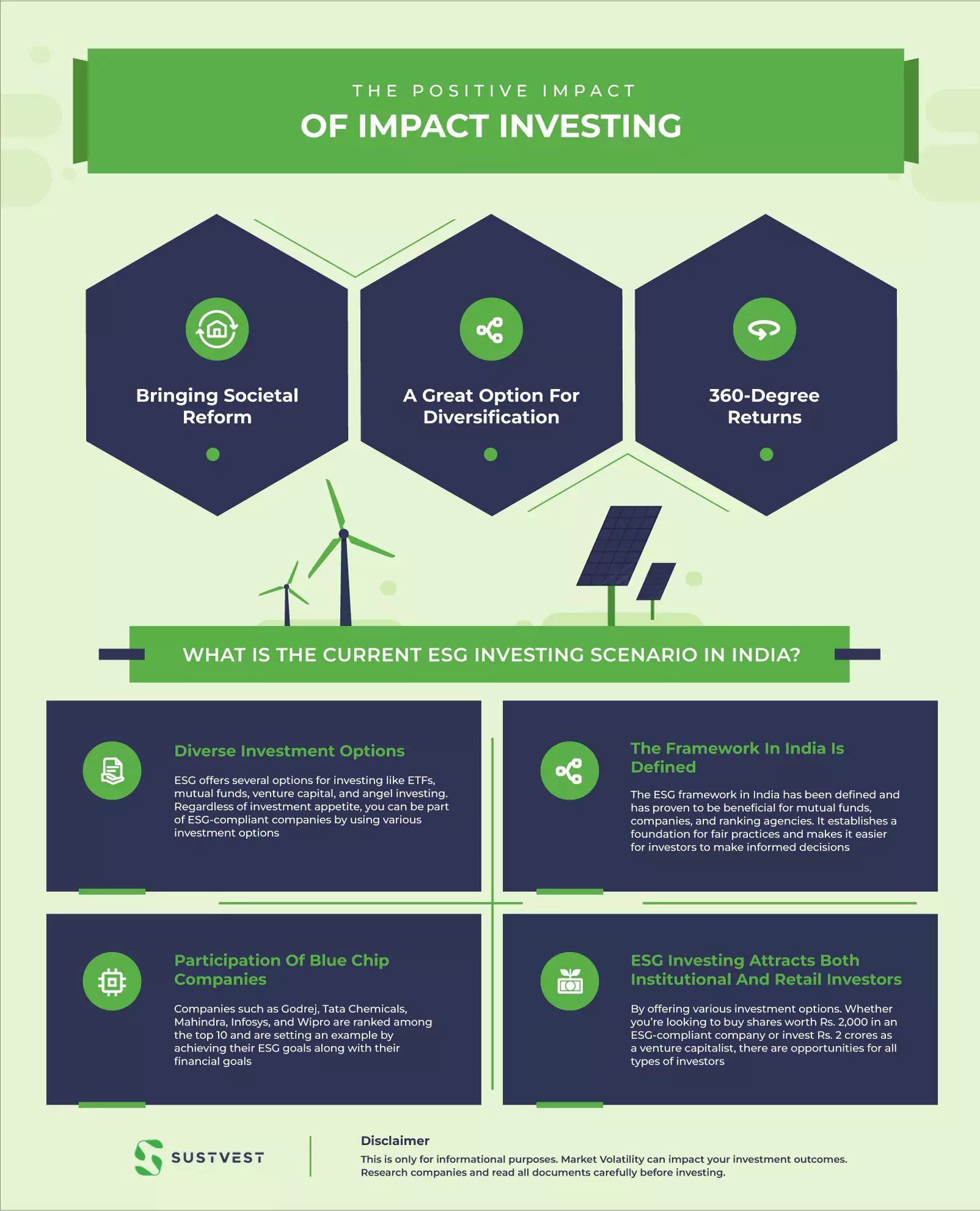Rewinding back to the 1990s, investors would have found it preposterous to invest based on the values of saving the society and planet with value-based investing and letting financial gains take a back seat.
And today companies are being called out for their unethical conduct, employee mistreatment, higher carbon emissions, and unsustainable practices in operations.
Previously, investors didn’t consider the impact of their investments on the environment or society. However, now, with value-based investing, there is more interest in investing in environmentally and socially responsible companies. As a result, sustainable investing is becoming more popular in India and is expected to grow to $125 billion by 2026, according to a report by Benori Knowledge.
ESG, impact investment, and SRI are three distinct investment strategies that have gained popularity in recent years as more investors look to align their investments with their personal values and beliefs.
While each of these approaches shares a common focus on investing for social and environmental good, they differ in their specific goals and methods. Understanding the differences between these strategies is crucial for investors looking to create a portfolio that reflects their unique priorities and goals.

What is Impact Investing?
Some investors confuse the term “impact investment” with “sustainable investment,” even though there are striking similarities between the two concepts, there is a remarkable difference
For instance, impact investment is focused on investing to create positive environmental change or to address social crises. It involves investing with the goal of saving the planet or bringing about social reform.
For example, impact investment means investing in companies that have sustainable packaging, source materials using renewable energy, or support social causes such as hiring specially-abled people in their workforce.
India’s Impact Investment Market
India is a rapidly emerging country with a diverse range of industries thriving in it. In recent years, impact investing has grown significantly in India, with a contribution of $10 billion to the social venture market over the past decade.
Sectors like agriculture, education, renewable energy, and healthcare have become popular choices for institutional investors looking to invest in socially responsible projects.
As India looks set to become a $5 trillion economy by 2025, there is still work to be done to meet the United Nations’ Sustainable Development Goals (SDGs).
However, the future of impact investing in India is looking promising, with increasing interest from both institutional and retail investors. As more investors become aware of the potential for impact investing to generate social and environmental impact alongside financial returns, it is likely that the sector will continue to grow and thrive in India.
The Positive Impact Of Impact Investing
Yes, impact investing is a cause-driven investment it will reap the benefits in the coming years some of which are as follows.
Bringing Societal Reform
One way that impact investing can bring out positive change is by driving reform in industries that address some of the biggest problems facing a nation
For example, an impact investor might choose to invest in a company that is working to develop renewable energy sources, or in a business that provides education or healthcare services to underserved communities.
By investing in these types of ventures, impact investors can help drive progress and innovation in sectors that are critical to the well-being of society.
A Great Option For Diversification.
If covid-19 has taught us one investing tip to swear by, it is diversification, when the tourism industry was struggling to meet ends, sustainable industries like the renewable industry made the biggest leap, increasing renewable consumption by 45%. Consequently, green investments have exceeded the benchmarks of many traditional investment indices.
360-Degree Returns
Impact investment not only talks about financial return like traditional investment, but it also offers environmental and social returns too. To put things into perspective, it addresses the longevity of any business based on sustainability, equality, and growth. It makes sure the business will be compatible to face future challenges.
What is ESG Investing?
ESG stands for Environmental, Social, and Governance factors, which are used to evaluate the sustainability and ethical impact of a company’s operations and investment opportunities.
ESG investing is like applying a filter while making investment decisions. Apart from seeking financial gains, ESG parameters, such as environmental impact, social responsibility, and good governance, ensure that you invest in a company that supports the environment in some way, cares for social relationships like employees, investors, and unions by meeting their needs, and is run ethically with fair standards.
For example, ITC may have been frowned upon due to its primary business of tobacco, but if you look at their ESG scores, they have been water positive for 20 years, carbon positive for 17 years, and solid waste recycling-positive for 15 years. They also came second in the S&P ESG index among the top 50 companies in India.
What Is the Current ESG Investing Scenario In India?
Diverse Investment Options
ESG offers several options for investing like ETFs, mutual funds, venture capital, and angel investing. Regardless of investment appetite, you can be part of ESG-compliant companies by using various investment options.
The Framework In India Is Defined
The ESG framework in India has been defined and has proven to be beneficial for mutual funds, companies, and ranking agencies. It establishes a foundation for fair practices and makes it easier for investors to make informed decisions.
Participation Of Blue Chip Companies
Companies such as Godrej, Tata Chemicals, Mahindra, Infosys, and Wipro are ranked among the top 10 and are setting an example by achieving their ESG goals along with their financial goals. By doing so, they are indirectly encouraging other companies to follow suit and are setting a trend where ESG is taken seriously.
ESG Investing Attracts Both Institutional And Retail Investors
By offering various investment options. Whether you’re looking to buy shares worth Rs. 2,000 in an ESG-compliant company or invest Rs. 2 crores as a venture capitalist, there are opportunities for all types of investors.

What is Social Responsible Investing (SRI)?
Socially responsible investing often places more weight on sustainable environmental values and returns than financial returns.
SRI doesn’t hesitate to exclude investments based on the nature of the business. For example, with negative screening, an SRI investor would avoid investing in companies associated with tobacco, gambling, alcohol, or war weapons – often called “sin stocks”.
On the other hand, positive screening, which is where ESG scores come in, allows investors to prioritize their investment decisions based on a company’s ESG parameters.
SRI is a broad term that encompasses ESG investing, impact investing, and other parameters such as negative and positive screening. Therefore, SRI is like the head of the family, while the other parameters are various representatives.
The Difference Between SRI, ESG, and Impact Investing
All three of these value-based investments prioritize social and environmental returns but on different levels.
While ESG and SRI involve excluding companies with negative outcomes, Impact Investing wouldn’t even consider them in the first place, as it only focuses on companies that make a difference.
ESG is more like calling out companies to work towards reducing their carbon footprint and encouraging them to adopt renewable energy in their operations.
Taking the previous example of ITC, Impact Investing, and SRI wouldn’t consider it, but it ranks among the top companies in ESG scores, showing that every company can improve their ESG scores by adopting sustainable practices.
Impact Investing mainly attracts private funds, angel investors, and institutional investors. However, with ESG and SRI, even retail investors can align their values with their investments.
Impact Investing is more black and white, whereas ESG and SRI somewhat fall into a grey area. SRI is closer to Impact Investing, and ESG is at the other end of the spectrum, where it is trying hard for every company to consider environmental and social factors in their operations and follow the parameters in mainstream investment scenarios.
Moreover, ESG is gradually becoming a traditional investment, while Impact Investing is still considered a hardcore alternative investment.
Take Away – Why Value-Based Investing Is the Future Of Investments?
A decade ago, value-based investing didn’t have much of a foothold in India. However, today, with the advent of three distinct strategies – SRI, ESG, and impact investing – investors are able to target different audiences in order to make a difference, whether on a small or large scale.
ESG and SRI leading a holistic change in how even giant companies run their operations. Meanwhile, impact investing is encouraging game changers to join the race.
For example, platforms like Sustvest allow investors to fund rooftop solar installation projects in commercial and residential spaces. With investments starting as low as ₹10,000 or ₹15,000, you can not only make a positive impact but also earn returns between 10-15% annually. This is an opportunity to invest with a purpose and make a difference.

Founder of Sustvest
Hardik completed his B.Tech from BITS Pilani. Keeping the current global scenario, the growth of renewable energy in mind, and people looking for investment opportunities in mind he founded SustVest ( formerly, Solar Grid X ) in 2018. This venture led him to achieve the ‘Emerging Fintech Talent of the Year in MENA region ‘ in October 2019.




